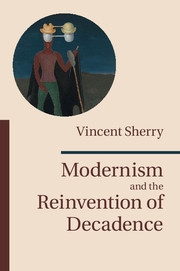Book contents
- Frontmatter
- Dedication
- Contents
- Acknowledgments
- Introduction The Codes of Decadence: Modernism and Its Discontents
- Chapter I The Time of Decadence
- Inter-chapter The Cultivation of Decay and the Prerogatives of Modernism
- Chapter II The Demonstrable Decadence of Modernist Novels
- Inter-chapter Imagism
- Chapter III Ezra Pound: 1906–1920
- Inter-Chapter Reforming Decadence: Late Romanticism, Modernism, and the Politics of Literary History
- Chapter IV T. S. Eliot: 1910–1922
- Afterword Barnes and Beckett, Petropi of the Twilight
- Notes
- Index
Afterword - Barnes and Beckett, Petropi of the Twilight
Published online by Cambridge University Press: 05 October 2014
- Frontmatter
- Dedication
- Contents
- Acknowledgments
- Introduction The Codes of Decadence: Modernism and Its Discontents
- Chapter I The Time of Decadence
- Inter-chapter The Cultivation of Decay and the Prerogatives of Modernism
- Chapter II The Demonstrable Decadence of Modernist Novels
- Inter-chapter Imagism
- Chapter III Ezra Pound: 1906–1920
- Inter-Chapter Reforming Decadence: Late Romanticism, Modernism, and the Politics of Literary History
- Chapter IV T. S. Eliot: 1910–1922
- Afterword Barnes and Beckett, Petropi of the Twilight
- Notes
- Index
Summary
“Sometimes in a phrase the characters spring to life so suddenly that one is taken aback,” T. S. Eliot writes in his introduction to Djuna Barnes’s Nightwood (1936), “as if one had touched a wax-work figure and discovered that it was a live policeman.” Eliot’s point is reiterated in this description of one of Barnes’s many characters, Count Onatario Altamonte: “‘The living statues,’ she said, ‘He simply adores them’” (N, 13). If the puppet impersonating the human provides an image of the poetics of decadence, so the artificial, post-natural, aftermath imaginary of its historical understanding is demonstrated extensively in this novel and centrally in the biographical fiction of her protagonist. In a family lineage of dubious (the German patronymic originates in “a Jew of Italian descent”) but ever declining title, Baron Felix Volkbein is a figure “born to holy decay” (N, 1, 107). He lives in the backward-oriented fantasy of his aristocratic background, centering a representation of the remnant temporality that provides for the poetic tempos as well as imaginative narratives in literary decadence. The repetition that fades in the poems of Swinburne and Rossetti, of Pound and of Eliot too, shows in the dissipating strength of the family name, whose doubtful origin also recalls the degraded state of originality itself in the attitudes and practices of decadent writing.
- Type
- Chapter
- Information
- Modernism and the Reinvention of Decadence , pp. 280 - 288Publisher: Cambridge University PressPrint publication year: 2014



